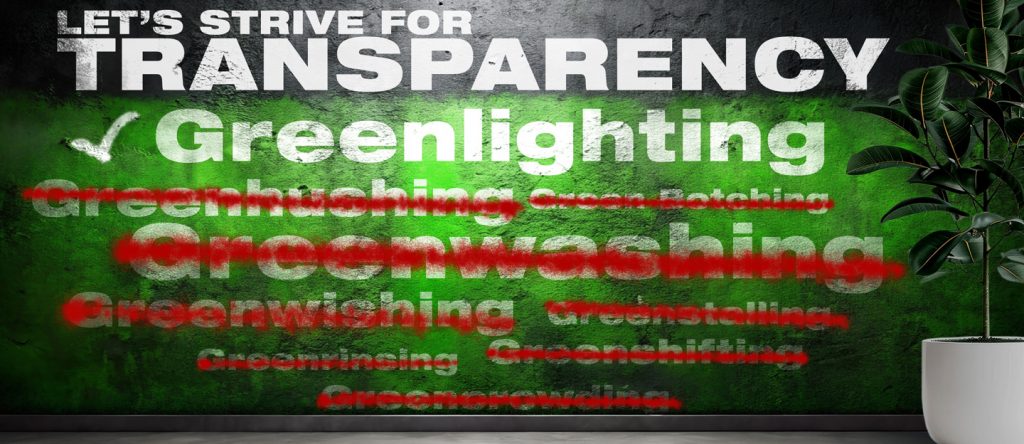Decoding Eco-Lingo: Understanding 9 “Green” Terms in Sustainable Business Conversations
– November 21, 2024 –
Summary: Green’ terms like greenwashing, greenhushing, and greenstalling often come up in discussions about environmental practices and corporate accountability, but what do they really mean? Understanding the language of sustainability is critical for businesses navigating today’s eco-conscious marketplace. Let’s take a closer look at these terms and explore nine “green” terms that are shaping contemporary eco-discourse.
In today’s business world, where sustainability and environmentalism are paramount, the language related to these movements has become increasingly complex. A variety of buzzwords have emerged to describe different practices (and malpractices). Terms like greenwashing, greenhushing, greenwishing, and greenstalling can lead to confusion.
Understanding these “green” terms and their implications is not just beneficial, but essential for consumers and businesses alike. By familiarizing yourself with these terms, you can navigate the sustainability landscape more effectively and make informed choices. Look at the definitions below and consider bookmarking this page for future reference as you explore sustainable practices.

- Greenwashing
Greenwashing, perhaps the most well-known term in this category, is a deceptive practice. It involves companies marketing their products or policies as environmentally friendly when they are not. This tactic aims to mislead consumers who are looking to make sustainable choices. An example of greenwashing might be a fossil fuel company promoting its recycling program while neglecting to address its significant environmental impact. It’s crucial to be aware of such tactics and stay vigilant, as they can lead to misguided decisions and a less sustainable future.
Read more about greenwashing and how to avoid it here>>
- Greenhushing
In contrast to greenwashing, greenhushing occurs when companies downplay or hide their environmental efforts to avoid criticism or scrutiny. This might happen if a business has made strides in sustainability but fears backlash over not being “green enough.” Although it might seem like a modest approach, greenhushing can inhibit transparency and discourage others from recognizing their achievements.
Read more about greenhushing and how to avoid it here>>
- Greenwishing
Greenwishing describes a situation where organizations express a desire to be more sustainable but fail to take tangible action towards those goals. It’s the equivalent of saying, “I wish I could help the environment,” without making any real commitment or effort to change behaviors. Essentially, it’s a contemplation that lacks substance.
- Greenstalling
Greenstalling refers to the deliberate delay in implementing sustainable practices or policies. Companies might use this tactic to postpone necessary action under the guise of needing more time to develop solutions. While they bide their time, they continue with unsustainable practices, often misleading stakeholders into thinking they are working towards greener alternatives.
- Green Botching
Green botching describes the failure of a company to execute its sustainability initiatives effectively. This can arise from poor planning, inadequate resources, or lack of expertise. The term highlights that even well-intentioned eco-efforts can fall flat if not correctly managed, potentially leading to wastage of resources and public disillusionment.
- Greenshifting
Greenshifting involves shifting the focus from significant environmental issues to smaller, less impactful efforts to project an eco-friendly image. For instance, a company may highlight minor changes—like using recyclable packaging—while ignoring larger pollution problems associated with its manufacturing processes. This tactic aims to redirect attention and critique away from more substantial issues.
- Greenrinsing
Greenrinsing can be viewed as an extension of greenwashing. It specifically refers to the practice of superficially enhancing environmental claims through misleading labeling or marketing. It’s a way for businesses to present themselves as eco-conscious without committing to genuine sustainable practices, often leading to consumer mistrust.
- Greencrowding
Greencrowding occurs when companies enter the sustainability arena not to enact meaningful change, but simply to capitalize on the growing market of environmentally conscious consumers. They crowd the space with initiatives that may lack substance or dedication. While the increase in green products can be positive, it’s essential to dissect the intentions behind the flood of new “eco-friendly” options.
- Greenlighting
Lastly, greenlighting refers to the approval and support of genuinely sustainable projects and initiatives, giving them the go-ahead to proceed. This term emphasizes a positive aspect of corporate responsibility and the recognition of the importance of sustainable practices. Companies that greenlight beneficial projects contribute meaningfully to environmental causes and set a positive example in their industries.

Incorporating sustainability into business practices and consumer choices is increasingly vital in today’s environmentally conscious marketplace. However, the emergence of terms like greenwashing, greenhushing, and the others complicates the discourse. Understanding these various terms enables consumers to navigate the green landscape more effectively and encourages companies to adopt genuine practices that contribute to a healthier planet. As we engage with these concepts, let’s strive for transparency, accountability, and real progress toward sustainability. These principles are not just ideals, but the foundation of a trustworthy and responsible approach to sustainability, providing reassurance and confidence in our collective efforts.
If you need help on your sustainable journey, we invite you to explore Quest’s website further and get in contact with us. We’d be happy to work together to make a positive impact!
About Quest: Quest is a national waste and recycling service provider that enables larger businesses to excel in achieving their environmental and sustainability goals and responsibilities. Quest delivers focused expertise across multiple industry sectors to build single-source, client-specific solutions that generate quantifiable business and sustainability results. Addressing a wide variety of waste streams and recyclables, Quest provides information and data that tracks and reports the environmental results of Quest’s services, gives actionable data to improve business operations, and enables Quest’s clients to excel in their business and sustainability responsibilities.









